A Comparative Analysis: Malthus, Singer, Poverty, Hunger, and Morality
VerifiedAdded on 2023/04/23
|9
|2555
|186
Essay
AI Summary
This essay delves into the perspectives of Thomas Malthus and Peter Singer on the critical issues of poverty and hunger. It examines Malthus's theory of population growth outpacing food supply and Singer's argument for the moral obligation of affluent individuals to aid the impoverished. The analysis includes a discussion of the strengths and weaknesses of both viewpoints, highlighting Malthus's realistic assessment of population growth versus food production and Singer's emphasis on humanitarian responsibility. The essay also addresses the limitations of each perspective, such as Malthus's conservative views on contraception and Singer's lack of specific guidelines for charitable actions. Ultimately, the essay concludes by emphasizing the importance of population control and environmental conservation in addressing global hunger and poverty.
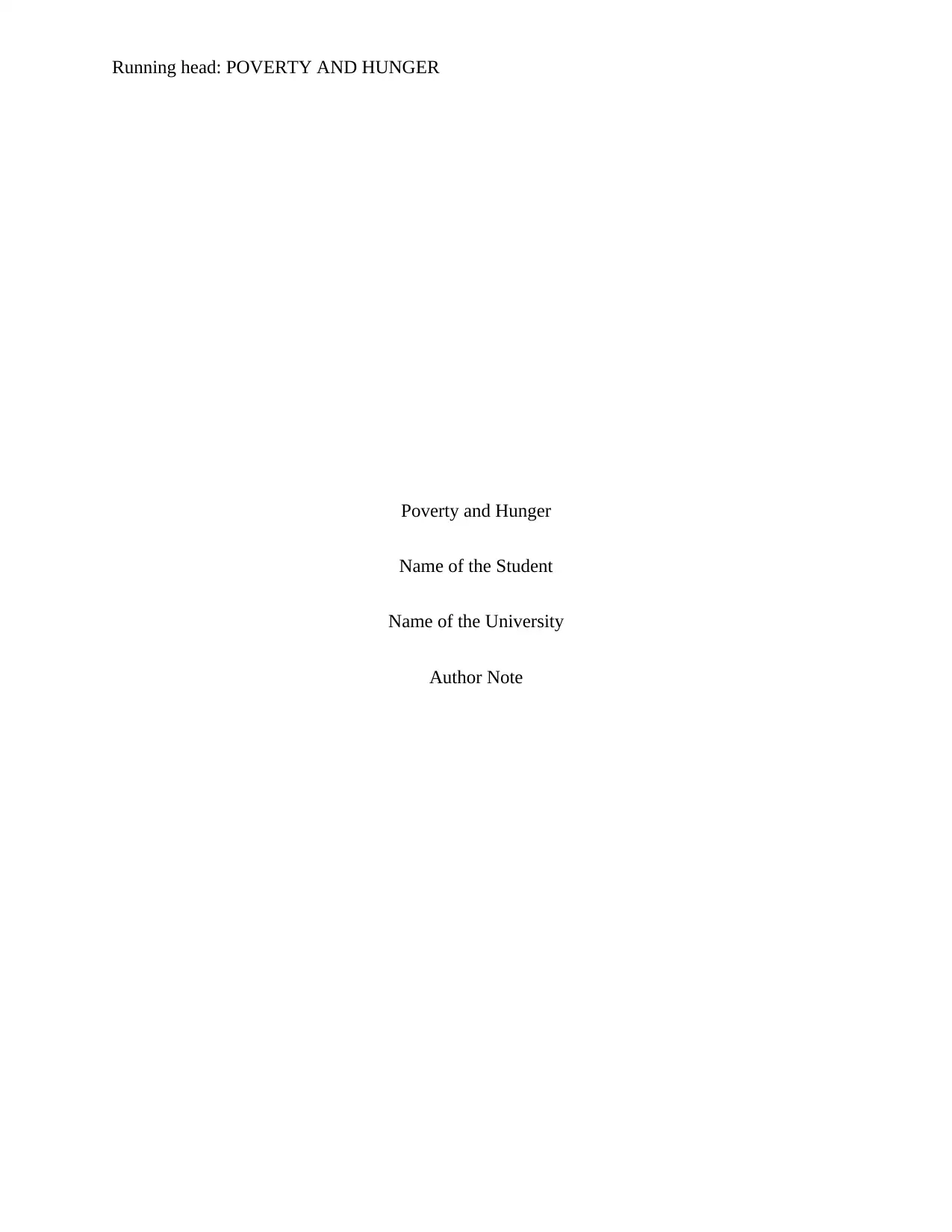
Running head: POVERTY AND HUNGER
Poverty and Hunger
Name of the Student
Name of the University
Author Note
Poverty and Hunger
Name of the Student
Name of the University
Author Note
Paraphrase This Document
Need a fresh take? Get an instant paraphrase of this document with our AI Paraphraser
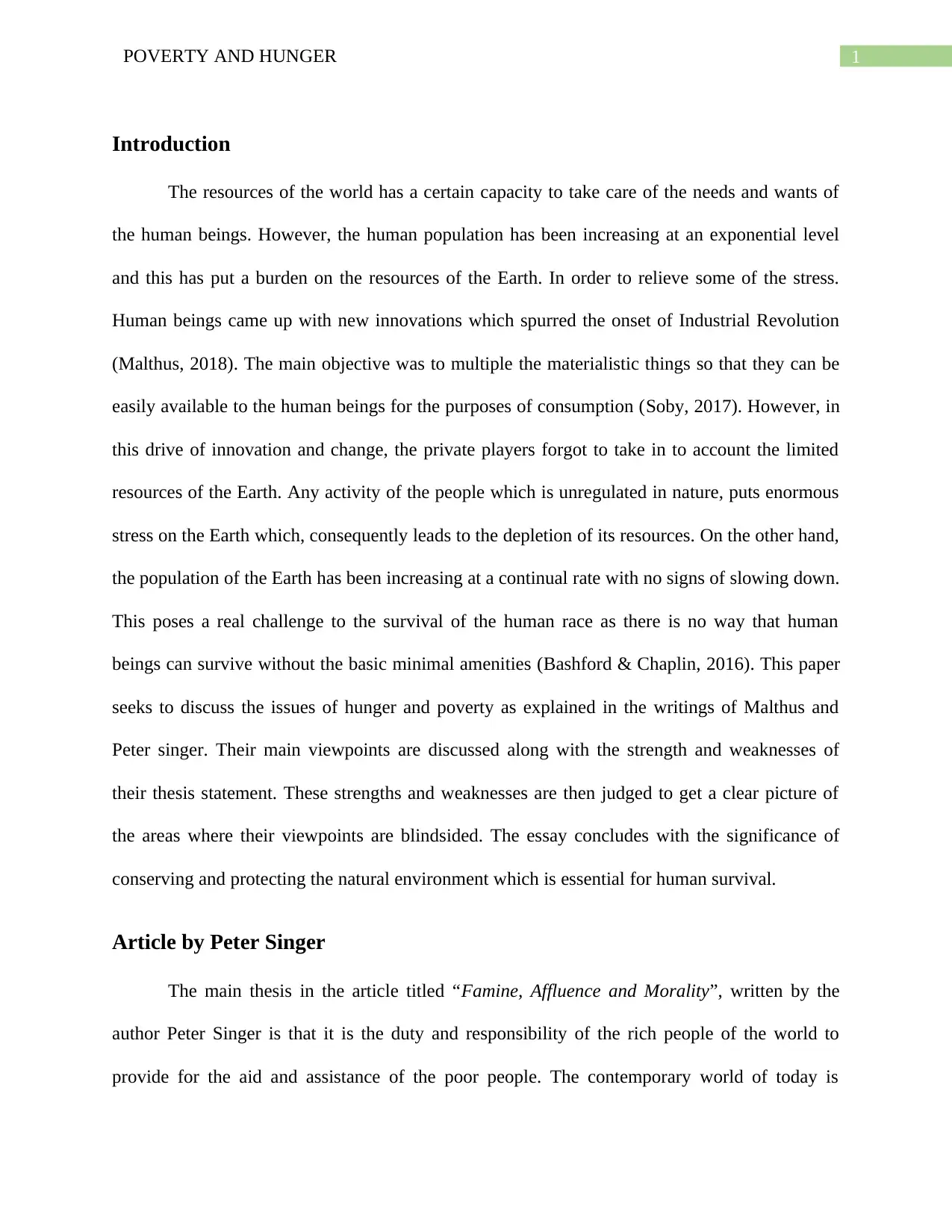
1POVERTY AND HUNGER
Introduction
The resources of the world has a certain capacity to take care of the needs and wants of
the human beings. However, the human population has been increasing at an exponential level
and this has put a burden on the resources of the Earth. In order to relieve some of the stress.
Human beings came up with new innovations which spurred the onset of Industrial Revolution
(Malthus, 2018). The main objective was to multiple the materialistic things so that they can be
easily available to the human beings for the purposes of consumption (Soby, 2017). However, in
this drive of innovation and change, the private players forgot to take in to account the limited
resources of the Earth. Any activity of the people which is unregulated in nature, puts enormous
stress on the Earth which, consequently leads to the depletion of its resources. On the other hand,
the population of the Earth has been increasing at a continual rate with no signs of slowing down.
This poses a real challenge to the survival of the human race as there is no way that human
beings can survive without the basic minimal amenities (Bashford & Chaplin, 2016). This paper
seeks to discuss the issues of hunger and poverty as explained in the writings of Malthus and
Peter singer. Their main viewpoints are discussed along with the strength and weaknesses of
their thesis statement. These strengths and weaknesses are then judged to get a clear picture of
the areas where their viewpoints are blindsided. The essay concludes with the significance of
conserving and protecting the natural environment which is essential for human survival.
Article by Peter Singer
The main thesis in the article titled “Famine, Affluence and Morality”, written by the
author Peter Singer is that it is the duty and responsibility of the rich people of the world to
provide for the aid and assistance of the poor people. The contemporary world of today is
Introduction
The resources of the world has a certain capacity to take care of the needs and wants of
the human beings. However, the human population has been increasing at an exponential level
and this has put a burden on the resources of the Earth. In order to relieve some of the stress.
Human beings came up with new innovations which spurred the onset of Industrial Revolution
(Malthus, 2018). The main objective was to multiple the materialistic things so that they can be
easily available to the human beings for the purposes of consumption (Soby, 2017). However, in
this drive of innovation and change, the private players forgot to take in to account the limited
resources of the Earth. Any activity of the people which is unregulated in nature, puts enormous
stress on the Earth which, consequently leads to the depletion of its resources. On the other hand,
the population of the Earth has been increasing at a continual rate with no signs of slowing down.
This poses a real challenge to the survival of the human race as there is no way that human
beings can survive without the basic minimal amenities (Bashford & Chaplin, 2016). This paper
seeks to discuss the issues of hunger and poverty as explained in the writings of Malthus and
Peter singer. Their main viewpoints are discussed along with the strength and weaknesses of
their thesis statement. These strengths and weaknesses are then judged to get a clear picture of
the areas where their viewpoints are blindsided. The essay concludes with the significance of
conserving and protecting the natural environment which is essential for human survival.
Article by Peter Singer
The main thesis in the article titled “Famine, Affluence and Morality”, written by the
author Peter Singer is that it is the duty and responsibility of the rich people of the world to
provide for the aid and assistance of the poor people. The contemporary world of today is
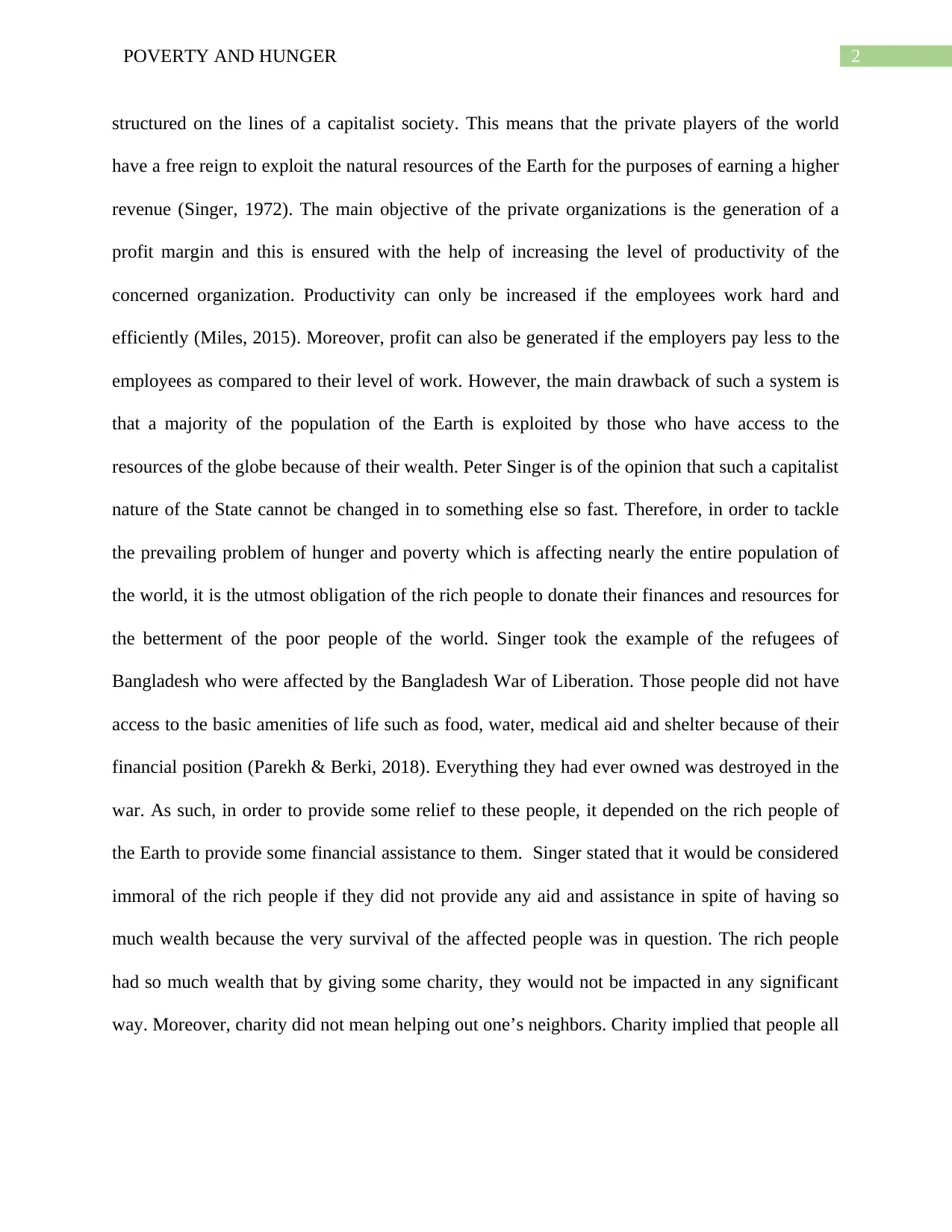
2POVERTY AND HUNGER
structured on the lines of a capitalist society. This means that the private players of the world
have a free reign to exploit the natural resources of the Earth for the purposes of earning a higher
revenue (Singer, 1972). The main objective of the private organizations is the generation of a
profit margin and this is ensured with the help of increasing the level of productivity of the
concerned organization. Productivity can only be increased if the employees work hard and
efficiently (Miles, 2015). Moreover, profit can also be generated if the employers pay less to the
employees as compared to their level of work. However, the main drawback of such a system is
that a majority of the population of the Earth is exploited by those who have access to the
resources of the globe because of their wealth. Peter Singer is of the opinion that such a capitalist
nature of the State cannot be changed in to something else so fast. Therefore, in order to tackle
the prevailing problem of hunger and poverty which is affecting nearly the entire population of
the world, it is the utmost obligation of the rich people to donate their finances and resources for
the betterment of the poor people of the world. Singer took the example of the refugees of
Bangladesh who were affected by the Bangladesh War of Liberation. Those people did not have
access to the basic amenities of life such as food, water, medical aid and shelter because of their
financial position (Parekh & Berki, 2018). Everything they had ever owned was destroyed in the
war. As such, in order to provide some relief to these people, it depended on the rich people of
the Earth to provide some financial assistance to them. Singer stated that it would be considered
immoral of the rich people if they did not provide any aid and assistance in spite of having so
much wealth because the very survival of the affected people was in question. The rich people
had so much wealth that by giving some charity, they would not be impacted in any significant
way. Moreover, charity did not mean helping out one’s neighbors. Charity implied that people all
structured on the lines of a capitalist society. This means that the private players of the world
have a free reign to exploit the natural resources of the Earth for the purposes of earning a higher
revenue (Singer, 1972). The main objective of the private organizations is the generation of a
profit margin and this is ensured with the help of increasing the level of productivity of the
concerned organization. Productivity can only be increased if the employees work hard and
efficiently (Miles, 2015). Moreover, profit can also be generated if the employers pay less to the
employees as compared to their level of work. However, the main drawback of such a system is
that a majority of the population of the Earth is exploited by those who have access to the
resources of the globe because of their wealth. Peter Singer is of the opinion that such a capitalist
nature of the State cannot be changed in to something else so fast. Therefore, in order to tackle
the prevailing problem of hunger and poverty which is affecting nearly the entire population of
the world, it is the utmost obligation of the rich people to donate their finances and resources for
the betterment of the poor people of the world. Singer took the example of the refugees of
Bangladesh who were affected by the Bangladesh War of Liberation. Those people did not have
access to the basic amenities of life such as food, water, medical aid and shelter because of their
financial position (Parekh & Berki, 2018). Everything they had ever owned was destroyed in the
war. As such, in order to provide some relief to these people, it depended on the rich people of
the Earth to provide some financial assistance to them. Singer stated that it would be considered
immoral of the rich people if they did not provide any aid and assistance in spite of having so
much wealth because the very survival of the affected people was in question. The rich people
had so much wealth that by giving some charity, they would not be impacted in any significant
way. Moreover, charity did not mean helping out one’s neighbors. Charity implied that people all
⊘ This is a preview!⊘
Do you want full access?
Subscribe today to unlock all pages.

Trusted by 1+ million students worldwide
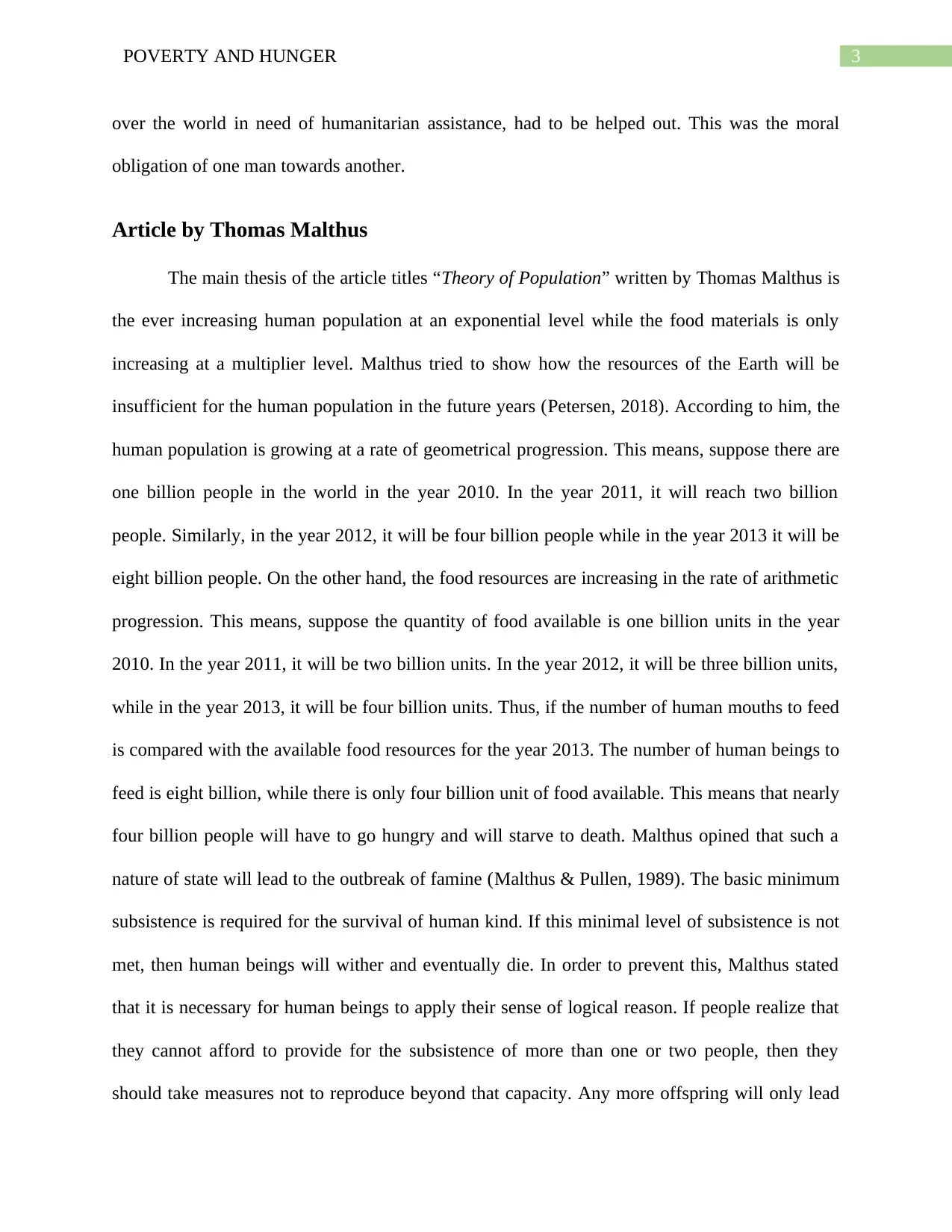
3POVERTY AND HUNGER
over the world in need of humanitarian assistance, had to be helped out. This was the moral
obligation of one man towards another.
Article by Thomas Malthus
The main thesis of the article titles “Theory of Population” written by Thomas Malthus is
the ever increasing human population at an exponential level while the food materials is only
increasing at a multiplier level. Malthus tried to show how the resources of the Earth will be
insufficient for the human population in the future years (Petersen, 2018). According to him, the
human population is growing at a rate of geometrical progression. This means, suppose there are
one billion people in the world in the year 2010. In the year 2011, it will reach two billion
people. Similarly, in the year 2012, it will be four billion people while in the year 2013 it will be
eight billion people. On the other hand, the food resources are increasing in the rate of arithmetic
progression. This means, suppose the quantity of food available is one billion units in the year
2010. In the year 2011, it will be two billion units. In the year 2012, it will be three billion units,
while in the year 2013, it will be four billion units. Thus, if the number of human mouths to feed
is compared with the available food resources for the year 2013. The number of human beings to
feed is eight billion, while there is only four billion unit of food available. This means that nearly
four billion people will have to go hungry and will starve to death. Malthus opined that such a
nature of state will lead to the outbreak of famine (Malthus & Pullen, 1989). The basic minimum
subsistence is required for the survival of human kind. If this minimal level of subsistence is not
met, then human beings will wither and eventually die. In order to prevent this, Malthus stated
that it is necessary for human beings to apply their sense of logical reason. If people realize that
they cannot afford to provide for the subsistence of more than one or two people, then they
should take measures not to reproduce beyond that capacity. Any more offspring will only lead
over the world in need of humanitarian assistance, had to be helped out. This was the moral
obligation of one man towards another.
Article by Thomas Malthus
The main thesis of the article titles “Theory of Population” written by Thomas Malthus is
the ever increasing human population at an exponential level while the food materials is only
increasing at a multiplier level. Malthus tried to show how the resources of the Earth will be
insufficient for the human population in the future years (Petersen, 2018). According to him, the
human population is growing at a rate of geometrical progression. This means, suppose there are
one billion people in the world in the year 2010. In the year 2011, it will reach two billion
people. Similarly, in the year 2012, it will be four billion people while in the year 2013 it will be
eight billion people. On the other hand, the food resources are increasing in the rate of arithmetic
progression. This means, suppose the quantity of food available is one billion units in the year
2010. In the year 2011, it will be two billion units. In the year 2012, it will be three billion units,
while in the year 2013, it will be four billion units. Thus, if the number of human mouths to feed
is compared with the available food resources for the year 2013. The number of human beings to
feed is eight billion, while there is only four billion unit of food available. This means that nearly
four billion people will have to go hungry and will starve to death. Malthus opined that such a
nature of state will lead to the outbreak of famine (Malthus & Pullen, 1989). The basic minimum
subsistence is required for the survival of human kind. If this minimal level of subsistence is not
met, then human beings will wither and eventually die. In order to prevent this, Malthus stated
that it is necessary for human beings to apply their sense of logical reason. If people realize that
they cannot afford to provide for the subsistence of more than one or two people, then they
should take measures not to reproduce beyond that capacity. Any more offspring will only lead
Paraphrase This Document
Need a fresh take? Get an instant paraphrase of this document with our AI Paraphraser
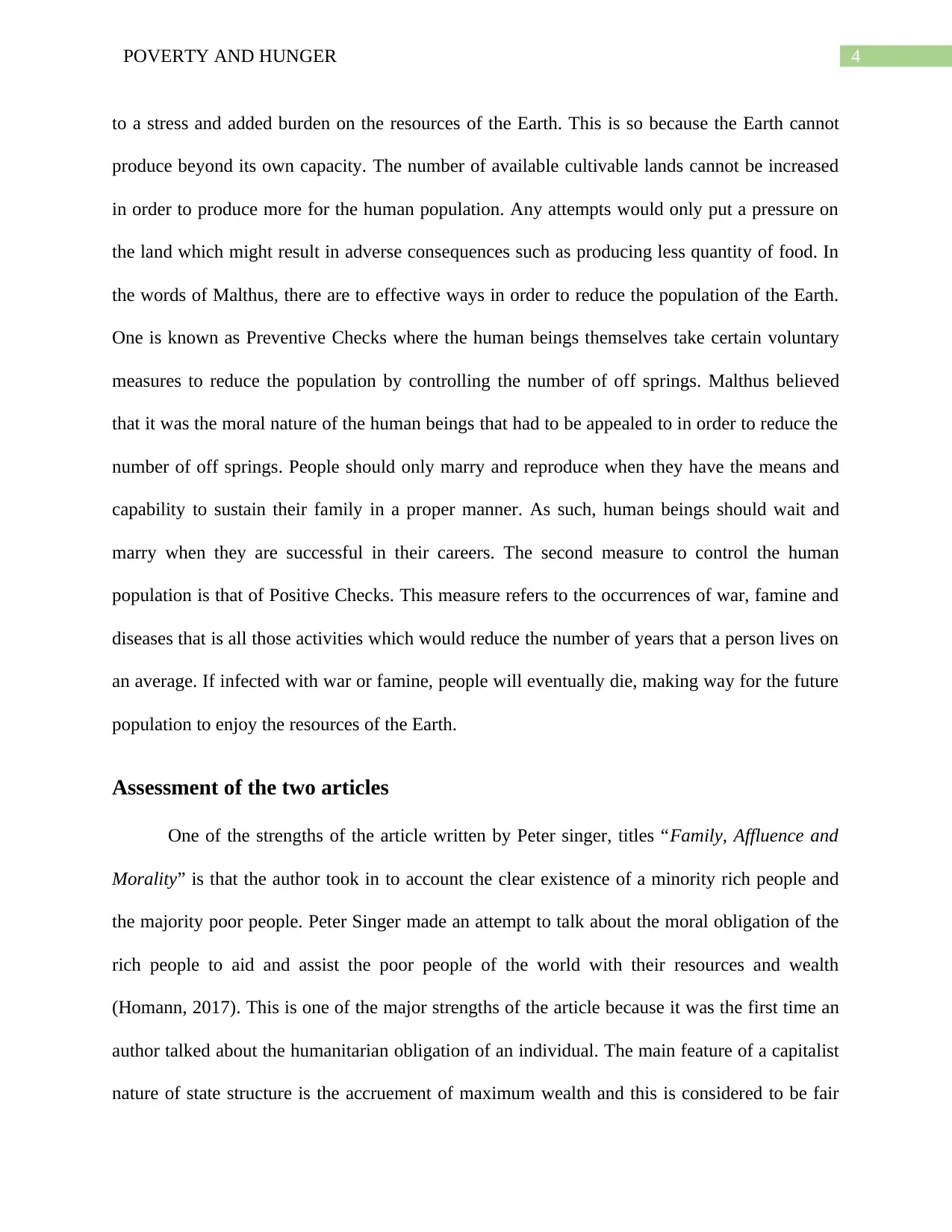
4POVERTY AND HUNGER
to a stress and added burden on the resources of the Earth. This is so because the Earth cannot
produce beyond its own capacity. The number of available cultivable lands cannot be increased
in order to produce more for the human population. Any attempts would only put a pressure on
the land which might result in adverse consequences such as producing less quantity of food. In
the words of Malthus, there are to effective ways in order to reduce the population of the Earth.
One is known as Preventive Checks where the human beings themselves take certain voluntary
measures to reduce the population by controlling the number of off springs. Malthus believed
that it was the moral nature of the human beings that had to be appealed to in order to reduce the
number of off springs. People should only marry and reproduce when they have the means and
capability to sustain their family in a proper manner. As such, human beings should wait and
marry when they are successful in their careers. The second measure to control the human
population is that of Positive Checks. This measure refers to the occurrences of war, famine and
diseases that is all those activities which would reduce the number of years that a person lives on
an average. If infected with war or famine, people will eventually die, making way for the future
population to enjoy the resources of the Earth.
Assessment of the two articles
One of the strengths of the article written by Peter singer, titles “Family, Affluence and
Morality” is that the author took in to account the clear existence of a minority rich people and
the majority poor people. Peter Singer made an attempt to talk about the moral obligation of the
rich people to aid and assist the poor people of the world with their resources and wealth
(Homann, 2017). This is one of the major strengths of the article because it was the first time an
author talked about the humanitarian obligation of an individual. The main feature of a capitalist
nature of state structure is the accruement of maximum wealth and this is considered to be fair
to a stress and added burden on the resources of the Earth. This is so because the Earth cannot
produce beyond its own capacity. The number of available cultivable lands cannot be increased
in order to produce more for the human population. Any attempts would only put a pressure on
the land which might result in adverse consequences such as producing less quantity of food. In
the words of Malthus, there are to effective ways in order to reduce the population of the Earth.
One is known as Preventive Checks where the human beings themselves take certain voluntary
measures to reduce the population by controlling the number of off springs. Malthus believed
that it was the moral nature of the human beings that had to be appealed to in order to reduce the
number of off springs. People should only marry and reproduce when they have the means and
capability to sustain their family in a proper manner. As such, human beings should wait and
marry when they are successful in their careers. The second measure to control the human
population is that of Positive Checks. This measure refers to the occurrences of war, famine and
diseases that is all those activities which would reduce the number of years that a person lives on
an average. If infected with war or famine, people will eventually die, making way for the future
population to enjoy the resources of the Earth.
Assessment of the two articles
One of the strengths of the article written by Peter singer, titles “Family, Affluence and
Morality” is that the author took in to account the clear existence of a minority rich people and
the majority poor people. Peter Singer made an attempt to talk about the moral obligation of the
rich people to aid and assist the poor people of the world with their resources and wealth
(Homann, 2017). This is one of the major strengths of the article because it was the first time an
author talked about the humanitarian obligation of an individual. The main feature of a capitalist
nature of state structure is the accruement of maximum wealth and this is considered to be fair
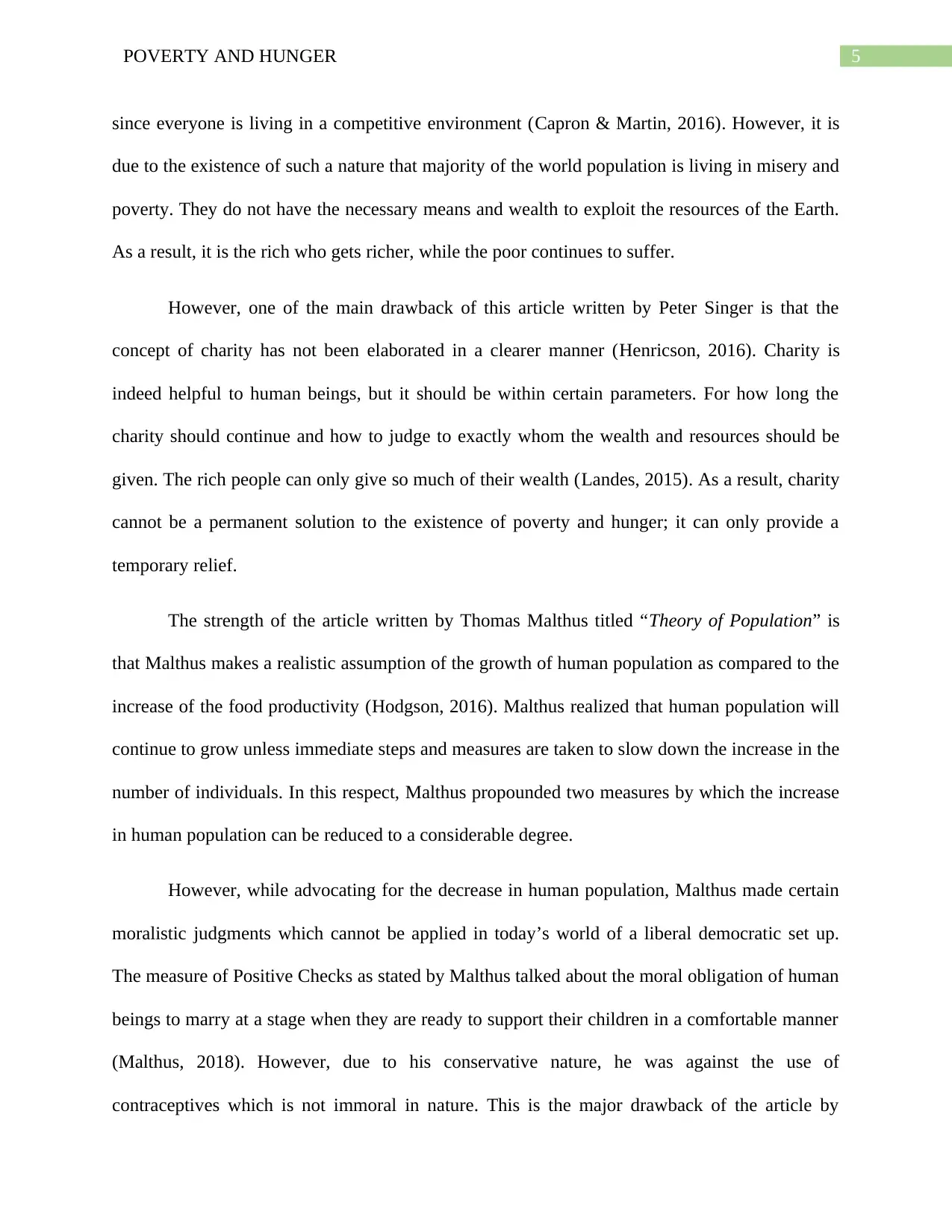
5POVERTY AND HUNGER
since everyone is living in a competitive environment (Capron & Martin, 2016). However, it is
due to the existence of such a nature that majority of the world population is living in misery and
poverty. They do not have the necessary means and wealth to exploit the resources of the Earth.
As a result, it is the rich who gets richer, while the poor continues to suffer.
However, one of the main drawback of this article written by Peter Singer is that the
concept of charity has not been elaborated in a clearer manner (Henricson, 2016). Charity is
indeed helpful to human beings, but it should be within certain parameters. For how long the
charity should continue and how to judge to exactly whom the wealth and resources should be
given. The rich people can only give so much of their wealth (Landes, 2015). As a result, charity
cannot be a permanent solution to the existence of poverty and hunger; it can only provide a
temporary relief.
The strength of the article written by Thomas Malthus titled “Theory of Population” is
that Malthus makes a realistic assumption of the growth of human population as compared to the
increase of the food productivity (Hodgson, 2016). Malthus realized that human population will
continue to grow unless immediate steps and measures are taken to slow down the increase in the
number of individuals. In this respect, Malthus propounded two measures by which the increase
in human population can be reduced to a considerable degree.
However, while advocating for the decrease in human population, Malthus made certain
moralistic judgments which cannot be applied in today’s world of a liberal democratic set up.
The measure of Positive Checks as stated by Malthus talked about the moral obligation of human
beings to marry at a stage when they are ready to support their children in a comfortable manner
(Malthus, 2018). However, due to his conservative nature, he was against the use of
contraceptives which is not immoral in nature. This is the major drawback of the article by
since everyone is living in a competitive environment (Capron & Martin, 2016). However, it is
due to the existence of such a nature that majority of the world population is living in misery and
poverty. They do not have the necessary means and wealth to exploit the resources of the Earth.
As a result, it is the rich who gets richer, while the poor continues to suffer.
However, one of the main drawback of this article written by Peter Singer is that the
concept of charity has not been elaborated in a clearer manner (Henricson, 2016). Charity is
indeed helpful to human beings, but it should be within certain parameters. For how long the
charity should continue and how to judge to exactly whom the wealth and resources should be
given. The rich people can only give so much of their wealth (Landes, 2015). As a result, charity
cannot be a permanent solution to the existence of poverty and hunger; it can only provide a
temporary relief.
The strength of the article written by Thomas Malthus titled “Theory of Population” is
that Malthus makes a realistic assumption of the growth of human population as compared to the
increase of the food productivity (Hodgson, 2016). Malthus realized that human population will
continue to grow unless immediate steps and measures are taken to slow down the increase in the
number of individuals. In this respect, Malthus propounded two measures by which the increase
in human population can be reduced to a considerable degree.
However, while advocating for the decrease in human population, Malthus made certain
moralistic judgments which cannot be applied in today’s world of a liberal democratic set up.
The measure of Positive Checks as stated by Malthus talked about the moral obligation of human
beings to marry at a stage when they are ready to support their children in a comfortable manner
(Malthus, 2018). However, due to his conservative nature, he was against the use of
contraceptives which is not immoral in nature. This is the major drawback of the article by
⊘ This is a preview!⊘
Do you want full access?
Subscribe today to unlock all pages.

Trusted by 1+ million students worldwide
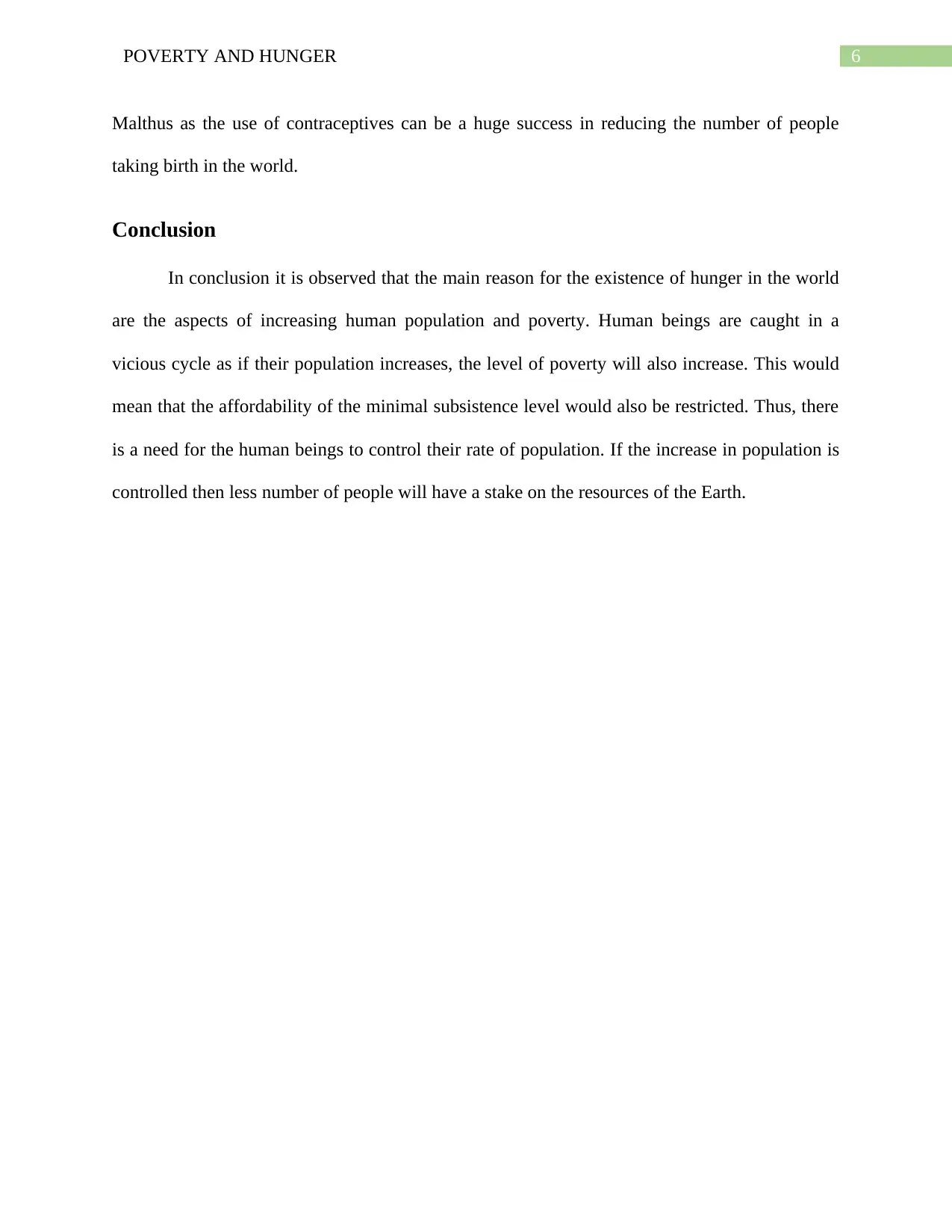
6POVERTY AND HUNGER
Malthus as the use of contraceptives can be a huge success in reducing the number of people
taking birth in the world.
Conclusion
In conclusion it is observed that the main reason for the existence of hunger in the world
are the aspects of increasing human population and poverty. Human beings are caught in a
vicious cycle as if their population increases, the level of poverty will also increase. This would
mean that the affordability of the minimal subsistence level would also be restricted. Thus, there
is a need for the human beings to control their rate of population. If the increase in population is
controlled then less number of people will have a stake on the resources of the Earth.
Malthus as the use of contraceptives can be a huge success in reducing the number of people
taking birth in the world.
Conclusion
In conclusion it is observed that the main reason for the existence of hunger in the world
are the aspects of increasing human population and poverty. Human beings are caught in a
vicious cycle as if their population increases, the level of poverty will also increase. This would
mean that the affordability of the minimal subsistence level would also be restricted. Thus, there
is a need for the human beings to control their rate of population. If the increase in population is
controlled then less number of people will have a stake on the resources of the Earth.
Paraphrase This Document
Need a fresh take? Get an instant paraphrase of this document with our AI Paraphraser
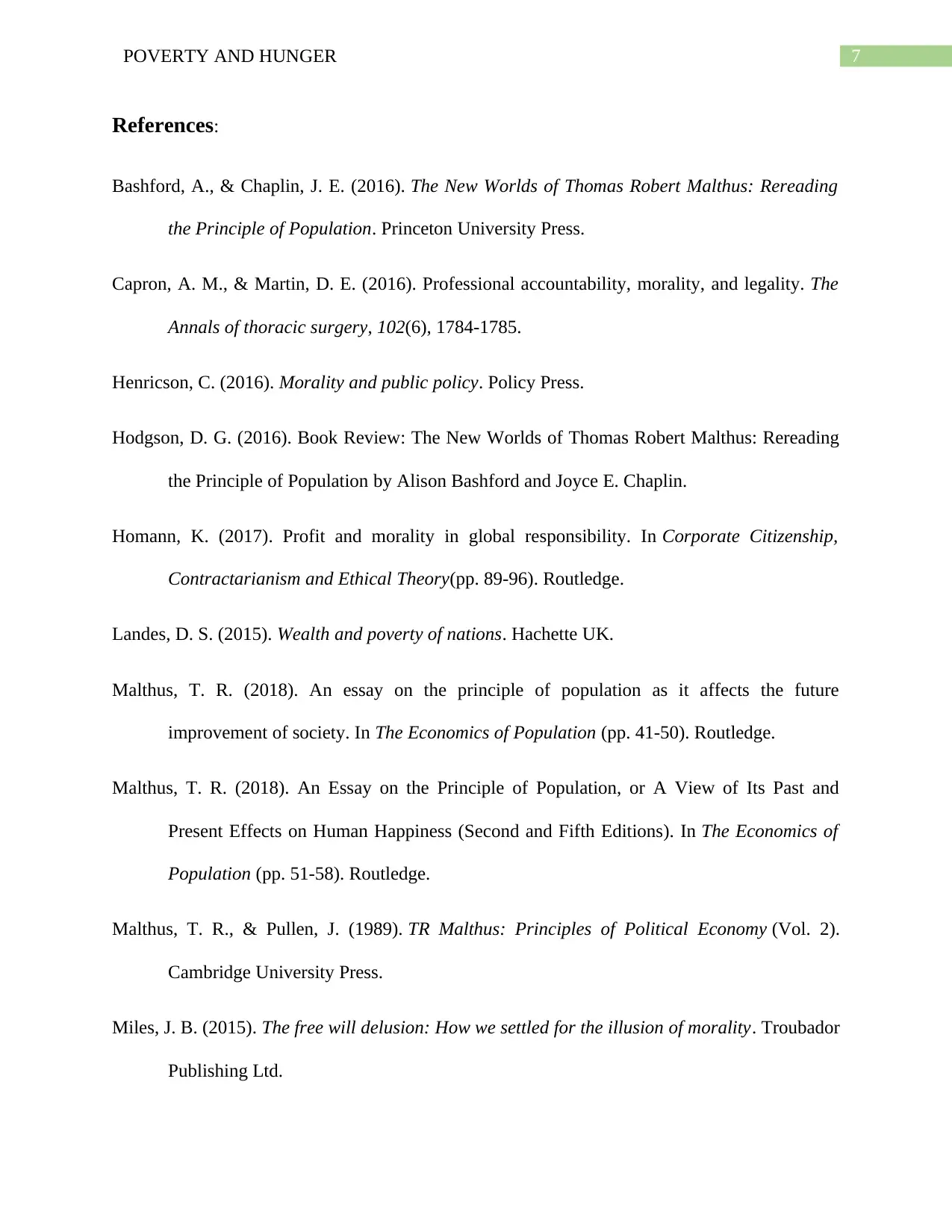
7POVERTY AND HUNGER
References:
Bashford, A., & Chaplin, J. E. (2016). The New Worlds of Thomas Robert Malthus: Rereading
the Principle of Population. Princeton University Press.
Capron, A. M., & Martin, D. E. (2016). Professional accountability, morality, and legality. The
Annals of thoracic surgery, 102(6), 1784-1785.
Henricson, C. (2016). Morality and public policy. Policy Press.
Hodgson, D. G. (2016). Book Review: The New Worlds of Thomas Robert Malthus: Rereading
the Principle of Population by Alison Bashford and Joyce E. Chaplin.
Homann, K. (2017). Profit and morality in global responsibility. In Corporate Citizenship,
Contractarianism and Ethical Theory(pp. 89-96). Routledge.
Landes, D. S. (2015). Wealth and poverty of nations. Hachette UK.
Malthus, T. R. (2018). An essay on the principle of population as it affects the future
improvement of society. In The Economics of Population (pp. 41-50). Routledge.
Malthus, T. R. (2018). An Essay on the Principle of Population, or A View of Its Past and
Present Effects on Human Happiness (Second and Fifth Editions). In The Economics of
Population (pp. 51-58). Routledge.
Malthus, T. R., & Pullen, J. (1989). TR Malthus: Principles of Political Economy (Vol. 2).
Cambridge University Press.
Miles, J. B. (2015). The free will delusion: How we settled for the illusion of morality. Troubador
Publishing Ltd.
References:
Bashford, A., & Chaplin, J. E. (2016). The New Worlds of Thomas Robert Malthus: Rereading
the Principle of Population. Princeton University Press.
Capron, A. M., & Martin, D. E. (2016). Professional accountability, morality, and legality. The
Annals of thoracic surgery, 102(6), 1784-1785.
Henricson, C. (2016). Morality and public policy. Policy Press.
Hodgson, D. G. (2016). Book Review: The New Worlds of Thomas Robert Malthus: Rereading
the Principle of Population by Alison Bashford and Joyce E. Chaplin.
Homann, K. (2017). Profit and morality in global responsibility. In Corporate Citizenship,
Contractarianism and Ethical Theory(pp. 89-96). Routledge.
Landes, D. S. (2015). Wealth and poverty of nations. Hachette UK.
Malthus, T. R. (2018). An essay on the principle of population as it affects the future
improvement of society. In The Economics of Population (pp. 41-50). Routledge.
Malthus, T. R. (2018). An Essay on the Principle of Population, or A View of Its Past and
Present Effects on Human Happiness (Second and Fifth Editions). In The Economics of
Population (pp. 51-58). Routledge.
Malthus, T. R., & Pullen, J. (1989). TR Malthus: Principles of Political Economy (Vol. 2).
Cambridge University Press.
Miles, J. B. (2015). The free will delusion: How we settled for the illusion of morality. Troubador
Publishing Ltd.
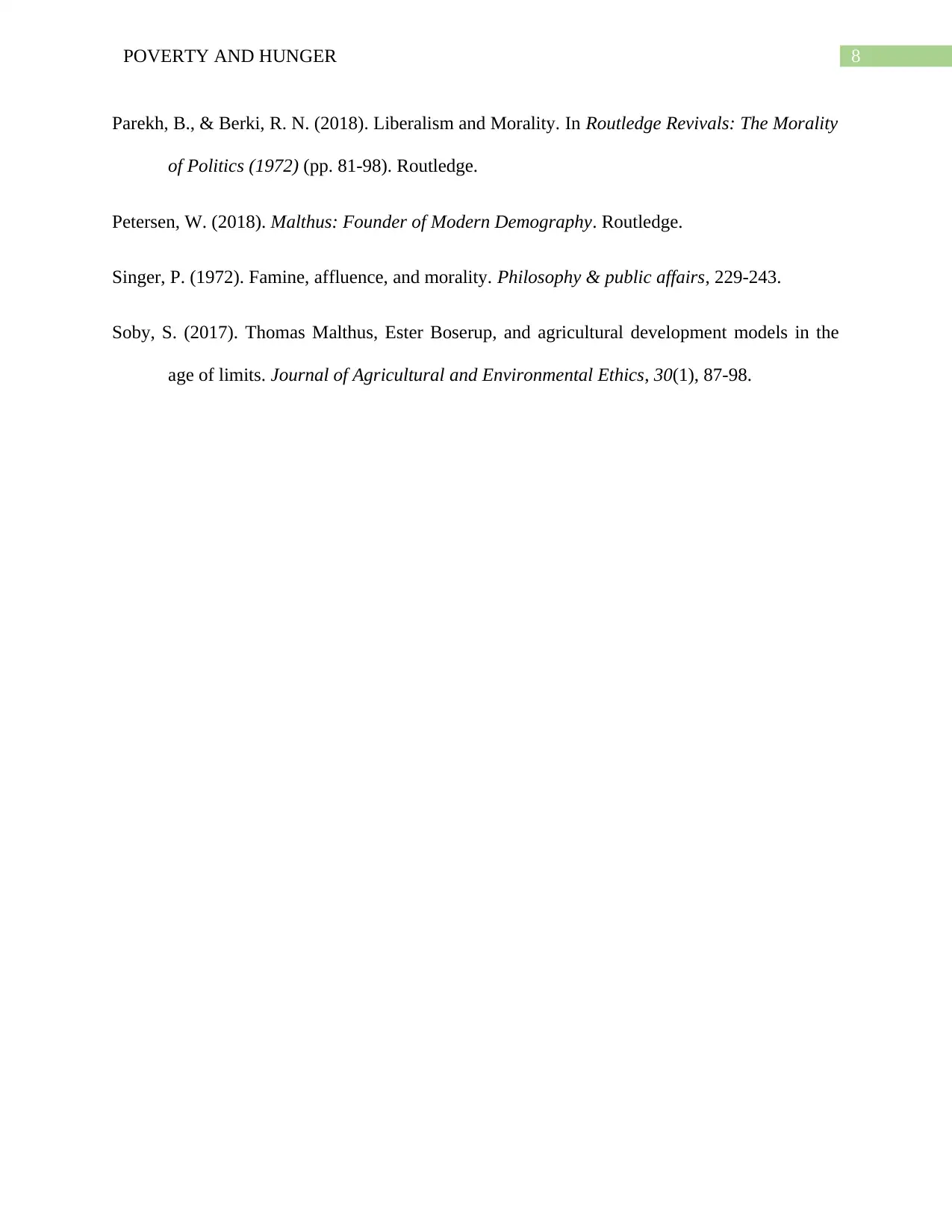
8POVERTY AND HUNGER
Parekh, B., & Berki, R. N. (2018). Liberalism and Morality. In Routledge Revivals: The Morality
of Politics (1972) (pp. 81-98). Routledge.
Petersen, W. (2018). Malthus: Founder of Modern Demography. Routledge.
Singer, P. (1972). Famine, affluence, and morality. Philosophy & public affairs, 229-243.
Soby, S. (2017). Thomas Malthus, Ester Boserup, and agricultural development models in the
age of limits. Journal of Agricultural and Environmental Ethics, 30(1), 87-98.
Parekh, B., & Berki, R. N. (2018). Liberalism and Morality. In Routledge Revivals: The Morality
of Politics (1972) (pp. 81-98). Routledge.
Petersen, W. (2018). Malthus: Founder of Modern Demography. Routledge.
Singer, P. (1972). Famine, affluence, and morality. Philosophy & public affairs, 229-243.
Soby, S. (2017). Thomas Malthus, Ester Boserup, and agricultural development models in the
age of limits. Journal of Agricultural and Environmental Ethics, 30(1), 87-98.
⊘ This is a preview!⊘
Do you want full access?
Subscribe today to unlock all pages.

Trusted by 1+ million students worldwide
1 out of 9
Related Documents
Your All-in-One AI-Powered Toolkit for Academic Success.
+13062052269
info@desklib.com
Available 24*7 on WhatsApp / Email
![[object Object]](/_next/static/media/star-bottom.7253800d.svg)
Unlock your academic potential
Copyright © 2020–2025 A2Z Services. All Rights Reserved. Developed and managed by ZUCOL.





